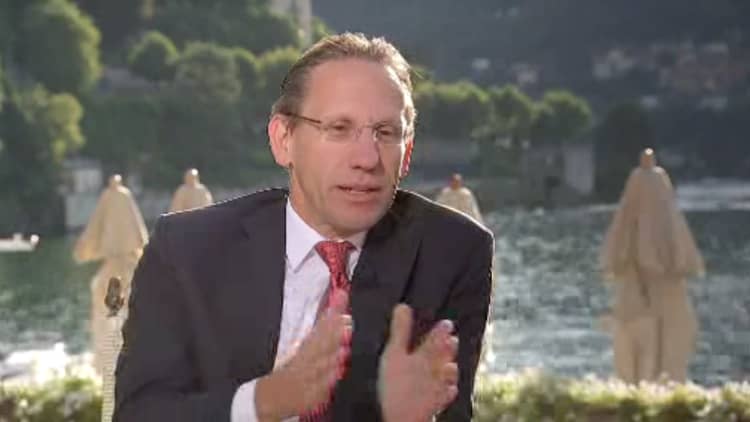
Germany isn't about to make use of its robust balance sheet to boost spending despite concerns over a growth slowdown, its deputy finance minister told CNBC Saturday.
Speaking to CNBC's Steve Sedgwick at the Ambrosetti Forum in Cernobbio, Italy, Jörg Kukies made it clear that Europe's largest economy will continue to prioritize a balanced budget over fiscal stimulus, even amid warnings of potential recession.
"No matter how nice the sun and the weather is here, you won't hear a different answer from me than to tell you that the position of the German government is fiscal soundness," Kukies said, in response to prodding about the need for greater spending amid weakening economic data.
Germany's annual growth rate slowed to 0.4% in the second quarter from 0.9% in the first, Reuters reported in August.
The country's industrial production in July unexpectedly dropped by 0.6%, according to Germany's statistics office, following a sharp 1.1% contraction during the previous month. A crisis in the country's massive car industry, a slowdown in orders from Asia and the U.S.-China trade war have all weighed heavily on the European economic powerhouse.
Kukies acknowledged some of these issues but maintained that his government's measures to support domestic activity have made up for them.
"Public investment growth over the past years has been 7%, so far stronger than GDP growth, the measures we've taken to strengthen domestic demand have been very substantial, so in that sense we are taking initiatives" to boost domestic growth, Kukies said.
"And of course our reduction in our debt-to-GDP levels gives us the firepower that if and when needed — not now, but potentially if there is a worsening situation, there is fiscal space."
"The domestic sector is still going very, very strong," Kukies added. "All our domestic-facing industries are growing, wages are growing, so in that sense the drawbacks that we've had from our internationally and globally-exposed corporate sector which are having issues and which have had revenue decreases and profit warnings, that has been compensated by the domestic sector."
"So in terms of the health of the German economy, we've certainly benefited massively from the fact that the fiscal measures we took were very positive on domestic demand."
Indeed, despite employment growth ticking downward across the euro zone, German unemployment remains just above its record low of 4.9%.
But the shrinking growth in Germany has contributed to a broader euro zone slowdown, with GDP growth in the 19-country area at 0.2% in the second quarter of 2019, down from 0.4% percent in the first, according to European Union statistics office Eurostat.
For Germany, a balanced budget — one where revenues match or outweigh expenditure — and price stability are pillars of the nation's collective psyche, which still has memories of the hyperinflation that crippled the Weimar Republic in the 1930s. A growing number of people voicing the call for increasing government spending is still unlikely to change that unless things get a lot worse, many analysts agree.
Some spending programs do have public support, however, particularly those focused on climate protection and reducing greenhouse gas emissions.
Since 2014, the country of 83 million has managed to raise public spending without adding new debt — registering a record budget surplus of 58 billion euros ($65 billion) in 2018.
—CNBC's Silvia Amaro contributed to this report.


